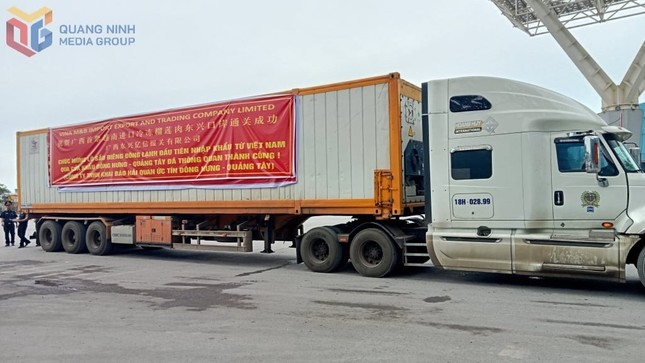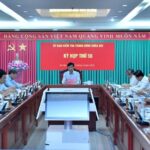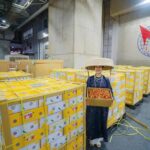On May 30, a 22-ton batch of frozen durian produced by Vina M&B Export and Trading Company Ltd. (Hanoi) was officially cleared through the Bac Luan II border gate, belonging to the Mong Cai (Vietnam) – Dongxing (China) border gate pair. The importing partner in China is Shanghai Xinronghe International Trade Co., Ltd., based in Shanghai.
This event took place just two days after a direct working session between Mr. Do Duc Duy, Vietnam’s Minister of Agriculture and Environment, and Ms. Sun May Jun, the General Administrator of China Customs, on May 28.
This batch of durian was produced following a strict process from raw material traceability to processing, freezing, packaging, and finished product inspection. Every step had to meet the regulations and technical standards stipulated in the Protocol signed by the two countries in August 2024. This is not only a technical requirement but also a commercial commitment that demonstrates the professionalism and determination to expand the market for Vietnam’s agricultural sector.
The successful export of this batch of frozen durian marks a notable turning point amid challenges in the fresh durian export market, especially regarding quality control and transportation time. Frozen durian has a longer shelf life and can maintain stable quality during long-distance transportation, thus expanding consumption potential deeper into the Chinese market – a market that highly favors this specialty fruit from Vietnam.
This event also affirms the efforts of Vietnamese businesses and authorities in adapting to the stringent standards of the international market and developing high-value-added products.
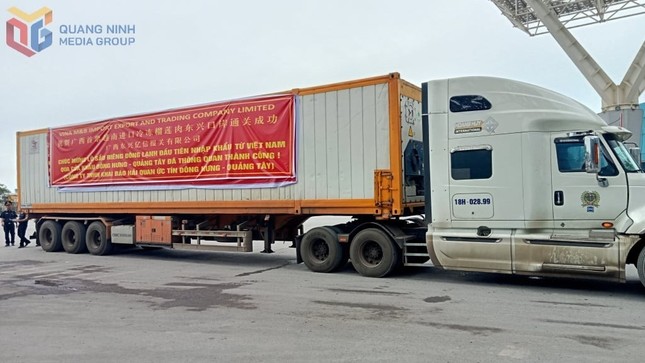
Vietnam’s first successful export batch of frozen durian to the Chinese market. Photo: Baoquangninh.vn.
The high-level dialogue on May 28 between the agricultural and customs management agencies of Vietnam and China not only paved the way for the first batch of frozen durian but also laid the foundation for more sustainable cooperation mechanisms in the future.
The two sides agreed to establish a “green lane for agricultural products,” a mechanism for expedited clearance at border gates for Vietnam’s fresh fruit during the peak harvest season, especially lychees and durians. This is considered a timely and effective solution to reduce agricultural congestion during the harvest season, giving farmers and businesses peace of mind in production.
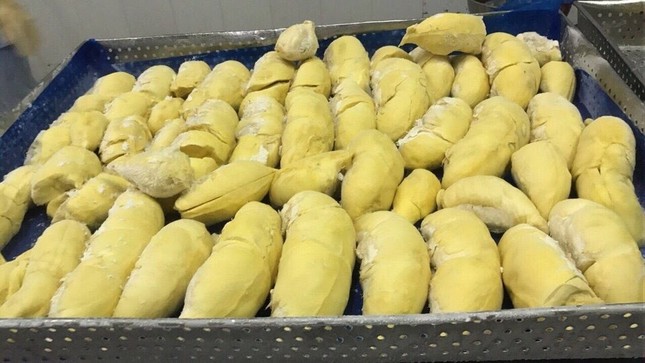
Frozen durian has a longer shelf life and maintains stable quality during long-distance transportation. Illustrative image: IT.
Additionally, China committed to extending working hours at the border gates during the harvest season, including weekends and after-hours. The two sides agreed to establish an early warning mechanism and share information on batches that violate regulations, enabling Vietnam to promptly handle and adjust. Notably, they established a permanent technical liaison at the border gates to efficiently handle any issues that may arise, ensuring smooth export activities.
In the long term, Vietnam’s Ministry of Agriculture and Environment has proposed to the General Administration of China Customs to consider adjusting food safety control measures for Vietnamese durian towards greater facilitation, especially during peak seasons. Vietnam hopes for China’s early approval to supplement laboratories capable of analyzing parameters such as Cadmium and Gold O to support pre-export quality testing.
Earlier, from March 2024, the Plant Protection Department – Ministry of Agriculture and Environment (now the Department of Crop Production and Plant Protection) sent documents to localities, requesting to review and synthesize frozen durian planting areas and packaging establishments for export to China.
According to this, packaging establishments of frozen durian must meet the requirements of food hygiene and safety, packaging processes, traceability, and food hygiene and safety control procedures (HACCP). This is accompanied by requirements for freezing capacity and cold storage.
China is a market with a huge demand for durian consumption. In a campaign called “durian diplomacy,” Beijing pledged to open up the domestic market and import more durian from Southeast Asian countries.
The Central Inspection Commission: Disciplinary Action and Recommendations for Officials
On May 29, in Hanoi, the 56th meeting of the Central Inspection Commission was held, chaired by Politburo member, Secretary of the Party Central Committee, and Head of the Central Inspection Commission Nguyen Duy Ngoc.
Wanted: Director Pham Ngoc Nong
On May 30th, the Investigative Police Office of Phu Yen Province announced that they have issued a special wanted notice for Pham Ngoc Nong (born 1983, residing in Phu Hiep 2 Ward, Hoa Hiep Trung Ward, Dong Hoa Town, Phu Yen Province).

